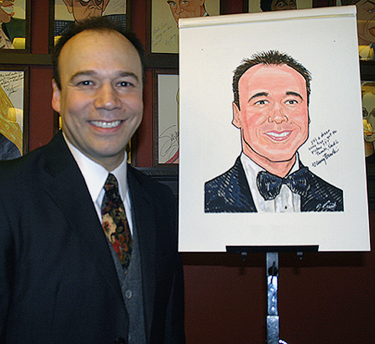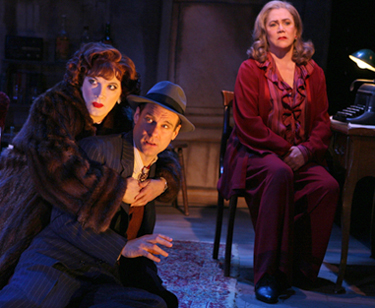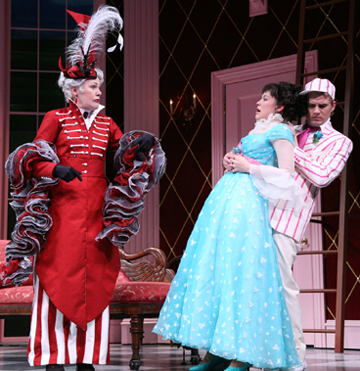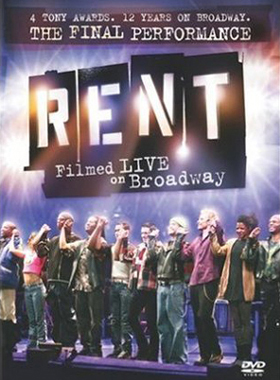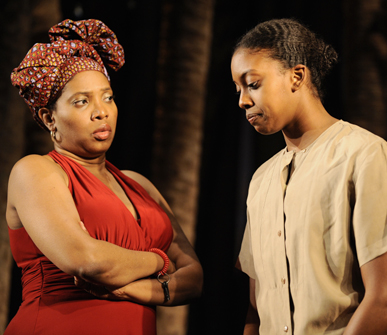
Give My Regards to Off-Broadway
For a reminder that Off-Broadway fare is often an excellent alternative to what may be found on Broadway, all you need do is look at the recent history of the Manhattan Theatre Club. A few months ago, even as the company's stage version of the classic film To Be or Not to Be was tanking at the Biltmore, its fine production of the gripping three-character play Back Back Back -- about steroid use in baseball -- was running in the smaller of MTC's two Off-Broadway venues at City Center.
Currently, Lynn Nottage's universally acclaimed Ruined, an extraordinary new play about the sexual degradation of women in the strife-torn Congo, is on the boards of MTC's City Center mainstage while the Biltmore houses an unnecessary revival of Richard Greenberg's The American Plan.
Among the many and varied entertainments currently on the Off-Broadway boards are Charles Busch's multi-layered genre spoof The Third Story, co-starring Bush and Kathleen Turner, at the Lucille Lortel; comedian Mike Birbiglia's one-man show Sleepwalk With Me, at the Bleecker Street Theater; and the return engagement of Christine Jorgensen Reveals, in which Bradford Louryck brilliantly lip-synchs to an old, recorded interview with the pioneering transsexual, at the Lion in the Theatre Row complex. Then there's The New Group's bold if misguided revival of Eugene O'Neill's Mourning Becomes Electra, a marathon work that isn't likely to turn up on Broadway anytime soon (unless Meryl Streep agrees to star in it).
This isn't to say that Off Broadway is free of disappointments; one current example is CSC's Uncle Vanya. But even when Off-Broadway shows misfire, they tend to be more interesting than what's seen on the Great White Way because they so often represent a distinctly non-mainstream and/or non commercial sensibility.
Aside from noteworthy stand-alone productions, the Off-Broadway landscape is enriched by the fact that two of New York's finest non-profit theaters, the Atlantic and the Vineyard, operate in this arena. The Atlantic is currently offering an acclaimed production of Martin McDonagh's The Cripple of Inishmaan, while the Vineyard hosts The Civilians in This Beautiful City. Among the tremendously worthwhile shows recently seen in Lincoln Center Theater's Off-Broadway venue, the Mitzi Newhouse, were the Flaherty-Ahrens musical The Glorious Ones and Paul Rudnick's comedy The New Century. The current occupant of the Newhouse is Happiness, a new musical that's generating lots of positive buzz in advance of its first preview performance on February 27.
You say you want more? The New York Theatre Workshop can always be counted on for boundary-pushing theater; its fairly recent production of Hedda Gabbler, which starred Elizabeth Marvel, was far superior to and much more intriguing than the Roundabout's present Broadway staging. As for The Public Theater: While that venerable institution is far less consistent than other Off-Broadway nonprofits in terms of the general quality of its shows, the sheer volume of theater produced there means that gold is sometimes to be mined down on Lafayette Street.
For economic reasons, Off-Broadways musicals are not as abundant as they used to be, but you still have quite a few to choose from. My number one recommendation at the moment is the York Theatre company's first-rate revival of the Joseph Stein-Stan Daniels musical Enter Laughing, sparked by Josh Grisetti's comic-genius performance in the central role.
It's always exciting to discover new musicals Off-Broadway, but don't forget about the shows that have been with us for awhile. In case you haven't heard, the all-time long-run champ The Fantasticks is in revival in the Jerry Orbach Theater at the Snapple Theatre Center, which is considered an Off-Broadway venue even though it's located right on Broadway (at 50th Street). Altar Boyz, at New World Stages, remains one of the most thoroughly entertaining shows in town -- and the current cast is awesome. And if you act now, you still have a chance to get in under the wire and see Forbidden Broadway again -- or for the first time! -- before it ends its three-decade run on March 1.
If all this isn't enough to convince you to check out what's playing Off-Broadway, consider the following very short list of hits that have transferred from that arena to Broadway within the past few years: The 25th Annual Putnam County Spelling Bee, Doubt, Avenue Q, Grey Gardens, Spring Awakening, In the Heights, and Dividing the Estate. Due this spring are transfers of Rock of Ages (from New World Stages to the Brooks Atkinson) and Next to Normal (which played at Second Stage last year and will soon come to the Longacre after a run of a rewritten version in Washington, D.C.) Here's looking forward!
********************
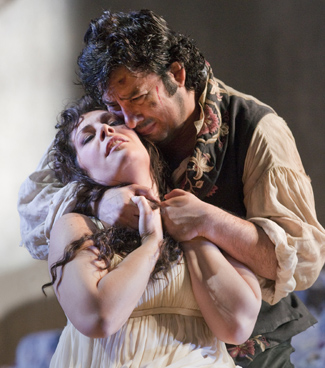
This Is the Story of Il Trovatore
Grand opera and American musical theater have much in common, of course, but they are very different in at least one major way: Due to the over-arching importance of an opera's score, several works with great music but less-than-great libretti have consistently held the stage, whereas even the finest musical theater score can't carry a show with a book that doesn't work -- e.g., House of Flowers, The Baker's Wife, Mack and Mabel, etc., etc.
For more than 150 years, Giuseppe Verdi's Il Trovatore has served as Exhibit A that an opera with a ridiculous libretto can serve as a cornerstone of the repertoire if the music is truly great. There are risible moments throughout this blood-red opera about love, lust, and vengeance in 15th-century Spain, but the plot turns and the characters' behavior in the final scene are so preposterous that we can only be glad it's the final scene. Yet Trovatore survives and thrives because most of its score -- including the soprano's exquisite "D'amor sull ali rosee," the tenor's thrilling "Di quella pira," the mezzo's gripping "Condotta," the baritone's gorgeously lyrical "Il balen del suo sorriso," and the immortal Anvil Chorus -- is fabulous.
Enrico Caruso himself once said that the only thing necessary for a successful performance of Il Trovatore is the four greatest singers in the world. In this regard, the Metropolitan Opera's new production is well equipped. Leonora is Sondra Radvanovsky, whose huge but supple voice is also exceptional in that its timbre somehow sounds dark and bright at the same time. (Think Callas.) Manrico is Marcelo Alvarez, whose tenor remains a marvel even if he cuts a less romantic figure on stage than he use to because of added poundage. Dolora Zajick proves once again that she pretty much owns the role of Azucena in our era. And as the Count di Luna, Dmitri Hvorostovsky sings and looks better than ever. I'd be remiss if I didn't also mention bass Kwangchul Youn, whose performance of Ferrando's music in the opera's first scene earned the audience's vociferous approval.
The Met has at least one generally reviled staging of Trovatore in its recent history, so I'm pleased to report that the present one is a winner. David McVicar, in his company debut, has moved the action of the opera forward to the early 1800s; this is no way harms the story, even if the new costumes (Brigitte Reiffenstuel) and the set design (Charles Edwards), which makes much use of an enormous turntable, do tend to put one in mind of Les Miz.
Conductor Ginandrea Noseda and chorus master Donald Palumbo make invaluable contributions to this presentation of an opera that is as beloved for its pule-quickening orchestrations and choruses as for its magnificent solo opportunities. So, my advice is: Damn the libretto! Full-speed ahead to the Met to catch Il Trovatore.
